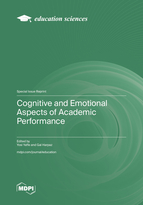Cognitive and Emotional Aspects of Academic Performance
A special issue of Education Sciences (ISSN 2227-7102). This special issue belongs to the section "Education and Psychology".
Deadline for manuscript submissions: closed (31 December 2023) | Viewed by 18131
Special Issue Editors
Interests: family climate and parenting styles and practices in various contexts of child’s educational and emotional outcomes; anxiety and impostor feelings in students
Interests: psychology of helping relations; performance psychology and academic achievements; parent-teacher-child relations; music and art education; individual differences and well-being; interpersonal and intergroup relations
Special Issue Information
Dear Colleagues,
The educational field has thoroughly examined the factors that contribute to academic success for many years. Theory and research in the field represent different aspects of the human learning process, throughout various stages of life development, from early childhood to old age. This Special Issue focuses on cognitive and emotional aspects related to academic success, in different education systems, from early childhood to adulthood.
The ability to identify the cognitive characteristics of the student, as well as characteristics or emotional states relevant to learning processes, will help improve student achievement. A better understanding of the relationship and interplay between emotional needs, family processes, cognitive abilities, and academic performance, will help to develop and cultivate the students’ capabilities and will contribute to the realization of the potential inherent in them.
This Special Issue sought to broaden the scope of variables and aspects involved in students’ (of all ages and types) academic performance and achievements, above and beyond the orthodox cognitive and emotional variables normally considered in this context. We particularly seek research articles utilizing rather broad, or unique, sets of variables to explain the academic and educational performance of all sorts. In this regard, studies testing the interplay between cognitive, familial, and emotional processes in various contexts of learning and educational performances are most welcome. Learning and educational performance are broadly defined, which not only includes academic achievements per se (i.e., grades), but also various measurable and quantifiable aspects of social and personal adjustment in the educational environment. Following this, studies including populations with special educational needs are especially welcome. We welcome high-quality academic papers of all research methodologies.
Possible topics include but are not limited to:
- Social-emotional skills in learning and academic development
- Students’ perceived cognitive-emotional competence and academic performance
- Stress, anxiety, and coping strategies and academic achievements
- Motivation and resilience and academic performance
- Executive Functions and Academic Performance
- The concept of the self (e.g., self-efficacy) and academic performance.
- Family climate, parent–child relations, and parental involvement in affinity to students’ adjustment and academic performance.
- Impostor syndrome and its direct and indirect association with various aspects of emotional and academic functioning.
- Self-regulated learning (SRL) and academic performance.
- Students with special needs: factors and parameters of educational/academic performance and emotional well-being in the education system.
Dr. Yosi Yaffe
Dr. Gal Harpaz
Guest Editors
Manuscript Submission Information
Manuscripts should be submitted online at www.mdpi.com by registering and logging in to this website. Once you are registered, click here to go to the submission form. Manuscripts can be submitted until the deadline. All submissions that pass pre-check are peer-reviewed. Accepted papers will be published continuously in the journal (as soon as accepted) and will be listed together on the special issue website. Research articles, review articles as well as short communications are invited. For planned papers, a title and short abstract (about 100 words) can be sent to the Editorial Office for announcement on this website.
Submitted manuscripts should not have been published previously, nor be under consideration for publication elsewhere (except conference proceedings papers). All manuscripts are thoroughly refereed through a double-blind peer-review process. A guide for authors and other relevant information for submission of manuscripts is available on the Instructions for Authors page. Education Sciences is an international peer-reviewed open access monthly journal published by MDPI.
Please visit the Instructions for Authors page before submitting a manuscript. The Article Processing Charge (APC) for publication in this open access journal is 1800 CHF (Swiss Francs). Submitted papers should be well formatted and use good English. Authors may use MDPI's English editing service prior to publication or during author revisions.
Keywords
- academic achievements
- academic performance
- social-emotional competence
- social-emotional learning
- self-regulation
- self-efficacy
- stress
- coping strategies
- metacognitive strategies
- learning-related emotions
- student/learner engagement
- learning motivation
- executive functions
- family climate
- parenting
- parental involvement
- impostor syndrome
- self-regulated learning







